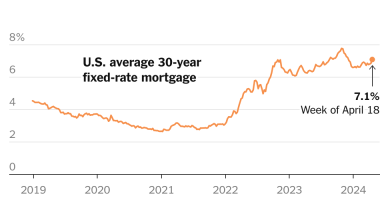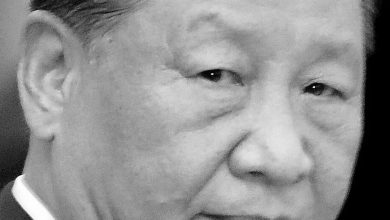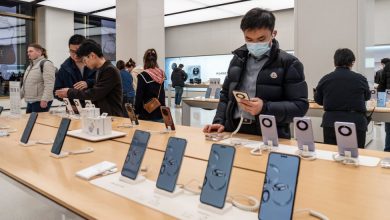Terry McAuliffe’s Other Obstacle in Virginia Race: Democrats’ Apathy

RICHMOND, Va. — Terry McAuliffe doesn’t do subtext well.
So when Mr. McAuliffe appeared on “Morning Joe” on MSNBC this week, it wasn’t long before the Democrat let slip the biggest challenge he’s facing next month in his bid to reclaim Virginia’s governorship. “People got to understand, Joe, this is about turnout,” he told the show’s co-host, Joe Scarborough.
Mr. McAuliffe could be forgiven for effectively reading his stage directions out loud. While he is running against a self-funding, and hazily defined, Republican, polls and interviews show that Mr. McAuliffe is confronting an equally daunting obstacle: Democratic apathy.
With former President Donald Trump out of office, congressional Democrats in a bitter standoff and Virginia Democrats having claimed every political prize, Mr. McAuliffe is straining to motivate the liberal voters in his increasingly blue state.
At the moment — one that is being watched closely by both parties for clues about the elections next year — he is bumping up against a fatigued electorate.
Virginia has elections every year, because its state campaigns are in odd-numbered years while its federal elections are, as everywhere, in even years. But voters here are drained from the Trump administration’s round-the-clock drama, which they felt more acutely because of their proximity to Washington, where the local news is also national news.
Then there is the 19-month fog of Covid-19, which has not only disrupted jobs, schools and daily life but also diverted attention from state politics — which had already been dimmed by the decline of local news outlets and eclipsed by national political news.
“A lot of folks are dealing with so many other things, I’m not sure that the broader community knows this is taking place, or that it’s rising to the level of importance,” said Sean Miller, who runs the Boys & Girls Club in a largely Black part of Richmond and who gave Mr. McAuliffe a tour of his center this week.
Mr. McAuliffe’s former education secretary, Anne Holton — the daughter of one former governor and the wife of another — was more succinct.
“People are a little exhausted,” Ms. Holton said after a round-table discussion about education in Alexandria. Still, she predicted “very high turnout.”
Mr. McAuliffe, in his well-caffeinated way, is doing all he can to sound the alarm.
He is stepping up his appearances on national cable news programs and summoning the biggest names in his party to cross the Potomac. Former President Barack Obama is coming to Virginia later this month, President Biden is expected soon after, and a parade of other surrogates, including Vice President Kamala Harris, are also on the way.
The once and potentially future governor, who by state law could not run for re-election after his term ended in 2018, is also trying to rouse complacent Democrats by amping up his rhetoric against his Republican rival, Glenn Youngkin.
Just as Gov. Gavin Newsom of California did before his larger-than-expected recall victory last month, Mr. McAuliffe is calling Democrats to the barricades by warning that Mr. Youngkin would build a liberal house of horrors in Virginia: Texas’ abortion laws, Florida’s Covid policies and, most ominous of all, Mr. Trump’s rebirth.
“We cannot let Trump off the mat — his comeback is not starting in Virginia,” Mr. McAuliffe told reporters outside Fairfax County’s main early-voting site on Wednesday. Then he paused for just a moment before adding, “Only if Democrats get out and vote.”
A pro-business Democrat with an unparalleled donor network, Mr. McAuliffe was seen by state Democrats as their safest choice. But with his decades of political experience as a fund-raiser and party leader, he’s not exactly a fresh face who will rally a new generation of voters to the polls.
In recent weeks, he has made no effort to hide his frustration that his party’s warring factions in Congress have held up a bipartisan infrastructure bill. And his aides fear that without some good news from Washington, the race could slip away.
While Mr. Biden carried the state by 10 points last year, public and private polling indicates the president’s approval rating has fallen to or below 50 percent in Virginia. Those same surveys suggest that Mr. McAuliffe and Mr. Youngkin are locked in a close race but that more of Mr. Youngkin’s voters are enthusiastic about voting compared with Mr. McAuliffe’s voters.
Tellingly, though, the greater the turnout projections, the wider Mr. McAuliffe’s lead grows in the polls.
That’s because of Virginia’s significant transformation from a Republican redoubt and hotbed of social rest to a multiracial archipelago of cities and suburbs that are as progressive as the rest of the country’s metropolitan areas. However, if voters in these population hubs, which are filled with immigrants and transplants, do not show up to the polls, Virginia may return a Republican to the governor’s mansion for the first time since 2009.
That was also the last time Virginians went to the polls in the first year under a new Democratic president, Mr. Obama, whose approval ratings, like Mr. Biden’s today, had sagged since he was sworn in. Turnout in Virginia collapsed to the lowest level for a governor’s race in four decades.
Unlike today, though, the previous unpopular Republican president, George W. Bush, had moved happily into retirement and ceded the spotlight fully to his successor.
The question now is if the accelerating demographic shift in Virginia — no Republican has won a statewide race since 2009 — and Mr. Trump’s continued presence on the political scene are enough to lift Democrats even in a less than favorable environment.
There are signs that those two factors could prove sufficient for Mr. McAuliffe, so long as he can galvanize Democrats in the same fashion as Mr. Newsom did.
While Virginia Democrats may in some ways be victims of their own success, having claimed every major office and taken control of the legislature, their dominance has also allowed them to loosen voting laws. While other Southern states have been tightening voting access, Virginia enacted expansive early voting this year. Residents can vote in person or by mail between Sept. 17 and Oct. 30.
What’s more, Northern Virginia has become increasingly hostile to Republicans. Fairfax County, the state’s most populous, split about evenly between Mr. Bush and Al Gore in 2000. Last year, Mr. Trump won just 28 percent of the vote there.
Mr. Youngkin, who, like Mr. McAuliffe, lives in Fairfax, is positioned to perform far better there. But the threat of Mr. Trump’s return to the White House has clearly alarmed voters in the affluent and well-educated county.
In interviews outside Fairfax’s early-voting site, every McAuliffe voter cited Mr. Trump as a reason for supporting the Democrat. Transportation, education and taxes — longtime core issues of Virginia governor’s races — were scarcely mentioned.
Paul Erickson, an architect from Vienna, Va., summoned a reporter back after revealing his concerns about Mr. Trump and said in an urgent tone that he had more to share.
“What I didn’t say is, for the first time in my adult life I fear for our nation,” Mr. Erickson said. “We’re tearing ourselves apart from within.”
Others were less expansive but equally to the point.
“I don’t like Trump, and I believe Youngkin is equal to Trump,” said Carol Myers, a retiree who, with her husband, was voting before playing a round of golf at the Army Navy Country Club in Arlington.
Mr. Youngkin’s aides are skeptical that their candidate, whom they’ve spent tens of millions of dollars painting as an inoffensive suburban dad, can be MAGA-fied.
On Thursday, though, the Republican received a reminder that Mr. Trump and his supporters are determined to make him take sides between them and Virginia’s broader, anti-Trump electorate.
Mr. Youngkin had so far avoided inviting Mr. Trump to the state — and avoided a Trumpian attack for the stiff arm. But the former president called into a Virginia political rally on Wednesday night and said, “I hope Glenn gets in there.” More problematic for Mr. Youngkin, event organizers pledged allegiance to a flag that had been present at the Jan. 6 rally after which supporters of Mr. Trump attacked the Capitol.
By the end of the day Thursday, Mr. Youngkin — who had skipped the rally to deny Democrats an opening to link him to Mr. Trump — issued a statement calling the use of the flag “weird and wrong.”
To Mr. McAuliffe it was something else: a political gift.
Mr. McAuliffe has tried to lash Mr. Youngkin to Mr. Trump, noting that he had gladly accepted the former president’s endorsement, and derides him as “a Trump wannabe,.”
If that Trumpification strategy works for Mr. McAuliffe, it will most likely be replicated by other Democrats running in blue and purple states next year.
In Virginia, it’s easy to understand why Democrats have gone back to the same well: Mr. Trump was a one-man turnout machine for them. In 2019, when only state House and Senate races were on the ballot, turnout reached almost the same level as in 2013, when Mr. McAuliffe won the governorship. During the 2018 congressional midterms, when Virginia Democrats picked up two House seats, turnout was at nearly 60 percent. Four years earlier, in a pre-Trump midterm, turnout here was less than 42 percent.
In Richmond’s Black community, Mr. Trump is still on the minds of some voters.
“It’s crazy to think that a president that lost still has such a hold on a certain group of people,” said Herman Baskerville, who owns Big Herm’s restaurant in the city’s historic Jackson Ward.
Standing outside his restaurant as dusk fell on quiet streets, however, Mr. Baskerville was more focused on the slowdown in foot traffic around Richmond during the coronavirus pandemic. Fewer people working in their offices has meant fewer customers.
“Many of us feel like we’re near normal, but there are a lot of folks who are still suffering,” said Mayor Levar Stoney of Richmond. Then Mr. Stoney, a protégé of Mr. McAuliffe’s, got back on message.
“My fear is, the policies you see in Florida and Texas, that could take Virginia backwards,” he said.



